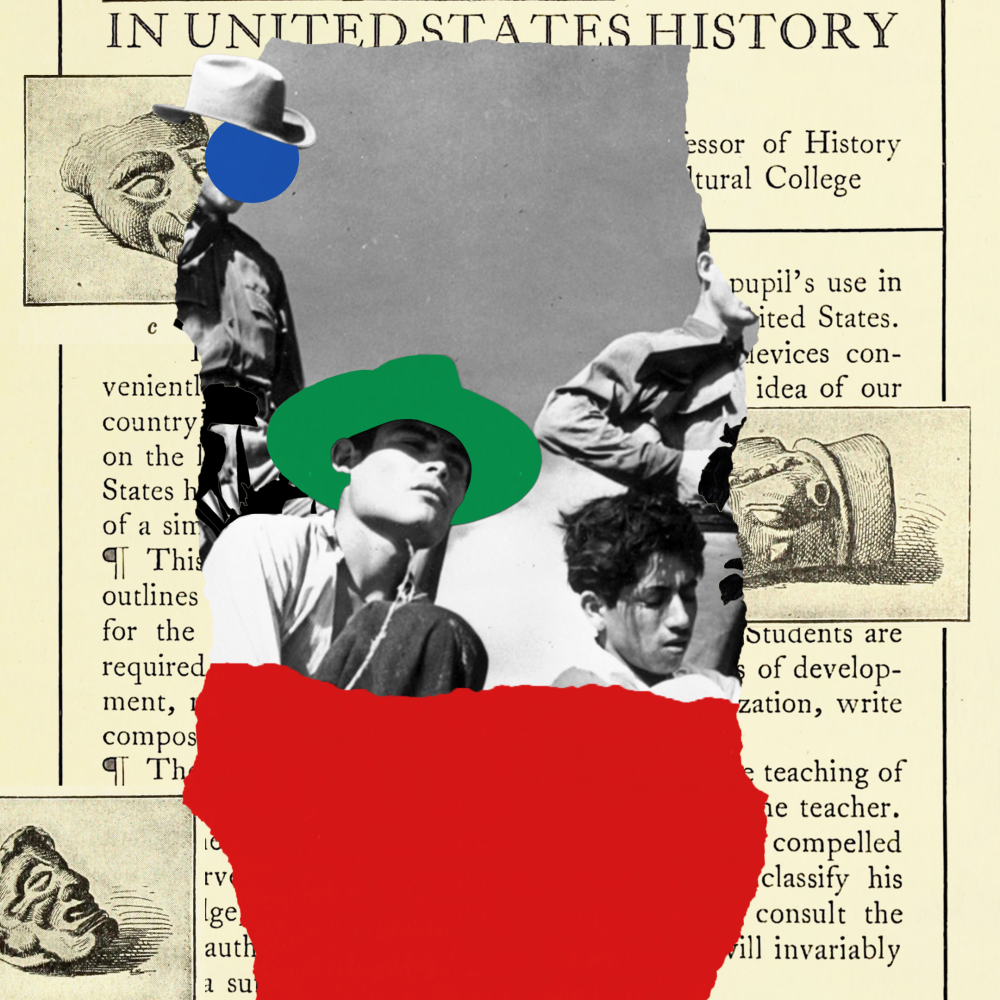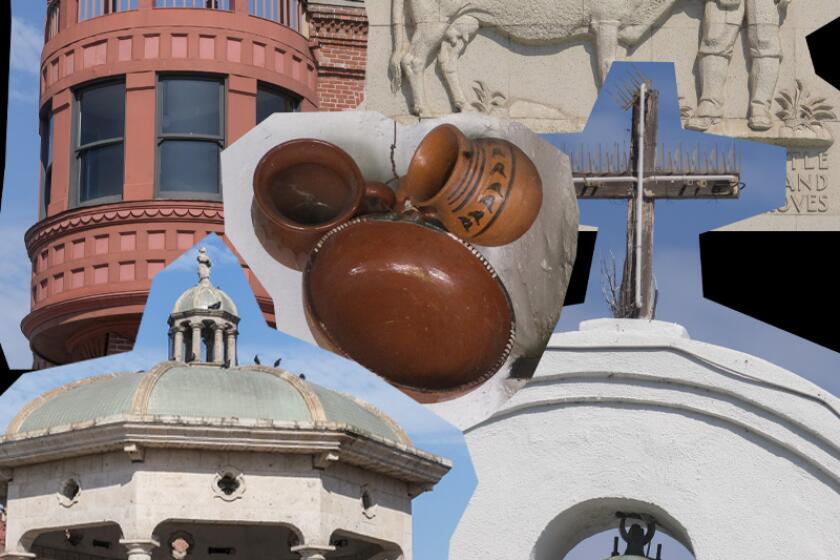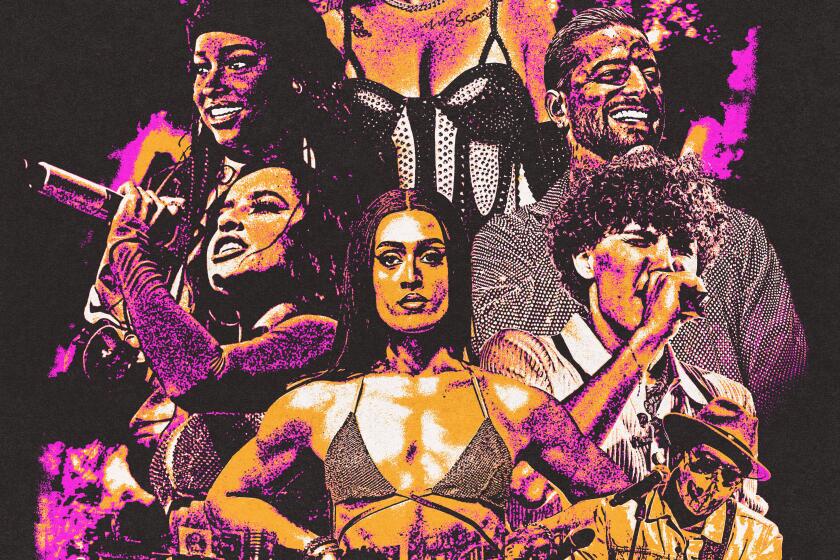
- Share via
To be born into a country is to inherit a narrative, a story that tells us who we are, where we’ve been and where we’re going. This is often delivered to us by a history textbook in school. Given the stakes, it’s no wonder that history textbooks have become a key battleground for warring ideologies.
Here in the United States, the story is about a plucky group of people seeking liberty and freedom who threw off the yoke of tyranny and became the most powerful nation in the world.
Going by the texts, this story also doesn’t have any Latinos in it.
Latino history in the U.S. is chronically under-covered in schools, according to a recent report from the Johns Hopkins Institute for Education Policy and UnidosUS. The report found that 87% of key Latino topics either were not covered in history textbooks or were only briefly referenced in five or fewer sentences.
In his 14-year tenure as music director of the L.A. Phil, conductor Gustavo Dudamel has made it a priority to incorporate Latin music into programming.
“Only 28 of 222 important topics were covered well, leaving out many aspects of the Mexican-American War, the Spanish-American War, the U.S. acquisition of Puerto Rico, the Panama Canal, the modern civil rights movement, Cold War politics, and legal developments shaping the Latino experience, such as the Voting Rights Act, the Civil Rights Act, and racial segregation,” a press release for the report reads.
This is all occurring (or, I suppose, not occurring) while U.S. classrooms include almost 14 million Latino students, making up more than a quarter of the 50.8 million public school students in the country right now.
This aligns with my own experience in public school, where I learned very little about Latinos in the U.S. and, in AP History, only briefly was exposed to the major pre-Columbian empires.
The lack of Latino history being taught in U.S. schools has been a known issue for years, with Latino advocacy groups rightfully calling out this exclusion and calling for more representation. I vividly recall Arizona’s ban on Mexican American studies that was found to be “motivated by racial animus” by a court in 2017.
The first edition of De Los|Reads features a new fiction book from Mario Vargas Llosa, a cookbook from Sandra A. Gutierrez, several memoirs and a book for children who aren’t ready for bed.
It’s a battle that’s been simmering for a while.
It probably won’t surprise anyone to hear that I’m adamantly in support of teaching more Latino history in U.S. schools. But I’m also interested in the why of it all. As in, why would the U.S. be so opposed to including Latino history in its textbooks? And if this is wrong of them to do, which I believe it is, what’s the best argument against it? Because I’m not sure the best argument is being put forth right now, with calls for representation and recognition of Latino accomplishments.
I think what’s needed, for all our sakes, is a reassessment of what we think history is meant to do, and what our places in it look like.
I understand and sympathize with the argument that Latino kids deserve to feel seen when learning about our country’s history, and that they deserve to know about the contributions that Latinos have made to it. But I’m reluctant to accept the idea that history, as a project, is primarily about recognizing contributions or making sure that your ethnic group is reflected in it. It’s not a heritage month celebration, and I think accepting the premise that history ought to be sentimental is flawed.
Where can you go in Los Angeles to uncover these stories? Here are 10 interesting and historic places to learn or think about L.A.’s Mexican history.
History is already used to present certain figures, governments, nations and other groups in a positive light while vilifying others. There is plenty of smoke and mirrors, and, to some extent, I think that’s inevitable.
We are story-based animals.
We need narratives to understand the world and to put ourselves in context. To do so entirely free of bias is impossible. But it’s something to strive for, and for good reason.
A nation that can’t confront itself, that can’t acknowledge its mistakes or its darkest hours, is a nation with no real path forward. It dooms itself to stasis, to an untenable position of constantly suppressing its past while the old wounds go untreated and are left to fester, thus causing more unrest.
Who are we protecting when we pretend white people don’t sometimes say wildly offensive things about people of color? It’s certainly not us.
History ought to be a tool against this, not a vanity mirror but a harsh light for looking at our human past with clarity so that we might move forward more wisely.
All of this warrants concern, but even more concerning than the erasure of Latinos, and other historically marginalized groups, from textbooks is the fact that it all seems to be in service of a broader push that is inherently anti-truth. It is part of an agenda to obfuscate the past of the United States, because, as is the case with many nation states, it’s a past full of power struggles, injustices and violence.
When we look at the intersecting miseries of the world right now, we can identify an unwillingness to address them at their source. Instead of recognizing them as systemic issues, there is a push to attribute them to moral failings.
The border crisis is one such case. It’s uncommon, when discussing the topic, for there to be any mention of the history of United States interventions in Latin America, of the destabilization of governments in the past or the extraction of resources that all together have contributed to the rise of violence and rule by rogue entities and, consequently, to people fleeing their homes. The narrative is that the United States is so great, and the quality of life so poor in Latin America, due to its inherently violent nature, that of course people would want to come here.
“El Tiny” completed its third annual takeover of NPR’s Tiny Desk concert series during Latinx Heritage Month. Produced by the Alt.Latino team, “El Tiny” featured eight acts from various corners of the Latino community.
The factors that are less flattering to the United States are downplayed, and we can see a similar instinct at play when discussing other realities of our nation’s history, like chattel slavery and the forced removal of Native Americans. The argument on the right is that such subjects only serve to stoke racial tensions and instill shame in young Americans. There’s no point, they argue, in assigning blame to the current generation for the sins of the past.
But it’s incredibly telling that they view history as a blame game. It’s not about blame. It’s about reckoning with reality.
My colleague Alex Zaragoza touched on a similar theme in her recent piece about the desire to remove racism from old media, a move that only serves to sanitize the history of Hollywood while doing nothing to improve the present situation for Latinos in the media.
We don’t need to be pandered to, condescended to or even celebrated by our history books. Yes, we want our contributions to be recognized.
According to the recent report from the Annenberg Inclusion Initiative at USC, Latino representation in Hollywood has not shown any meaningful growth in the last 16 years.
But before that, we want the truth. We are not demanding flattery. We want to be acknowledged as part of the fabric of this society, warts and all, because that’s the reality. We are a massive factor in the U.S., and pretending otherwise serves absolutely no one.
Does some of our history make the U.S. look bad? Certainly. But if the goal is to instill pride in our country through learning about our history, then that goal is not accomplished, or at least not sustainably accomplished, by sanitizing the past.
A country I would be proud of takes its mistakes seriously, is candid about them, and is committed to avoiding them in the future.
That’s not the country we live in right now, but it could be. For that to happen, though, we have to be willing to tell the truth.
JP Brammer is a columnist, author, illustrator and content creator based in Brooklyn. He is the author of ”Hola Papi: How to Come Out in a Walmart Parking Lot and Other Life Lessons,” based on his successful advice column. He has written for outlets including the Guardian, NBC News and the Washington Post. He writes a weekly column for De Los.
More to Read
The Latinx experience chronicled
Get the Latinx Files newsletter for stories that capture the multitudes within our communities.
You may occasionally receive promotional content from the Los Angeles Times.












